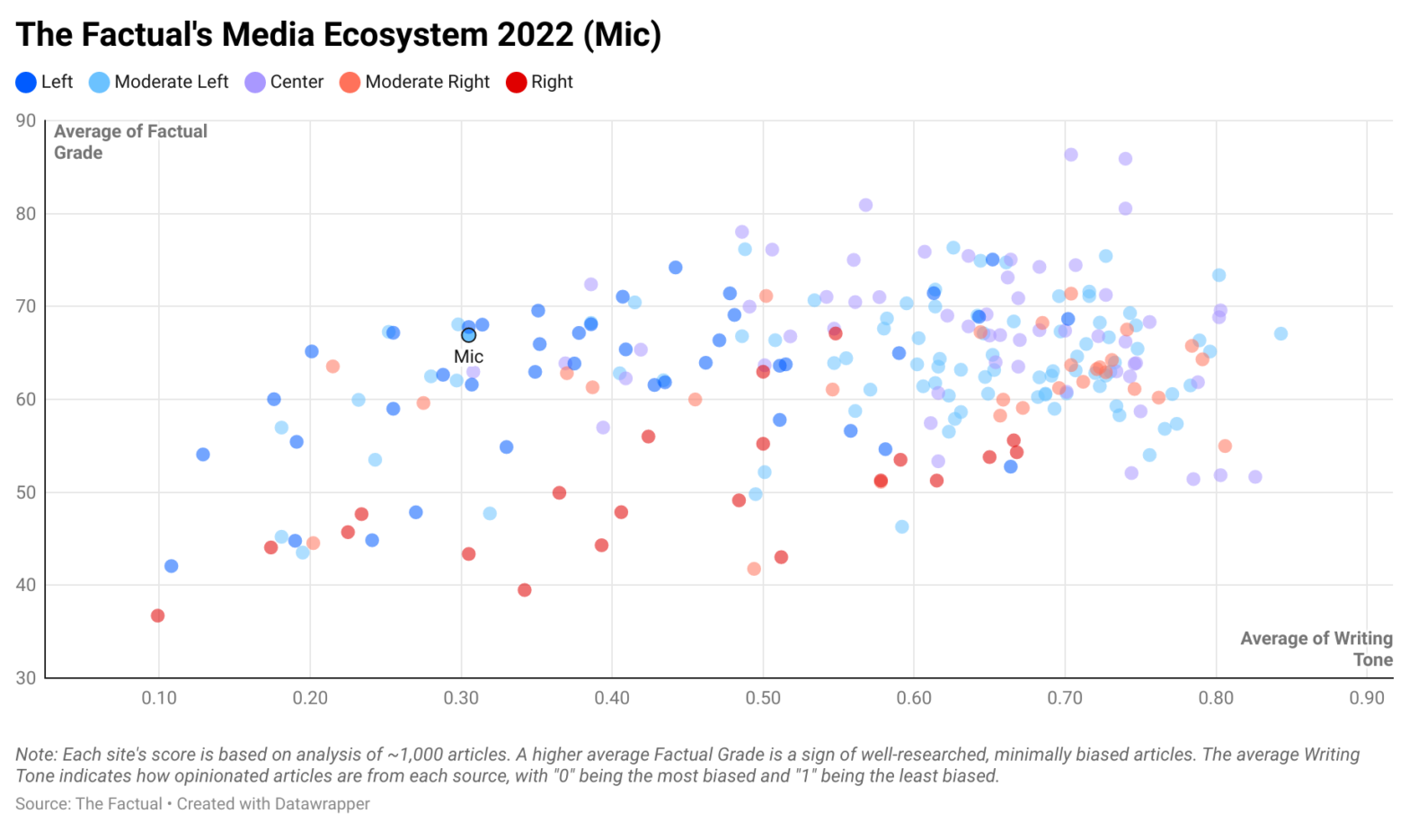Mic is an American media company known for catering to millennials and “helps young people process the present.” The site enjoyed a meteoric rise in the early 2010s, popularized by coverage of the Arab Spring, but faced major cutbacks in 2017 before being purchased by BDG Media. Mic has also developed a reputation for presenting news with an exclusively left-leaning lense. Given this background, The Factual asks: how reliable are articles from Mic?
How Does The Factual Rate News Sources?
The Factual analyzes more than 10,000 news stories every day to help readers find the most informative, least-biased articles. Our news-rating algorithm scores each article along four metrics: (1) cited sources and quotes, (2) publication history, (3) writing tone, and (4) author expertise. These scores combine in a weighted average we call a Factual Grade, which ranges from 0–100%. (See our How It Works page to learn more about our algorithm.)
For this study, we analyzed ~1,000 articles each from 240 news sources. The average Factual Grade for the entire dataset was 62.5%. Based on these averages, we can compare the performance of news sites across the media ecosystem. The entire dataset can be explored in greater detail here.
How Factual Is Mic?
Mic scored an average Factual Grade of 66.9%, placing it in the 67th percentile of our dataset. Mic’s scores are driven upwards by a strong team of authors who regularly publish on the same topics for the site, indicating topical expertise. Many articles exhibit strong sourcing, meaning they link to a diverse range of high-quality sources, though some articles do not reach this standard. However, highly opinionated writing lowers overall scores, driven by highly biased language in many articles.
Like any news source, scores for articles from Mic varied widely based on factors like author expertise and cited evidence. For example, some scored above 80%, while others scored below 50%.
How Opinionated Is Mic?
One of the metrics The Factual uses is the Writing Tone, which measures how opinionated the writing is in an article. For this metric, the algorithm looks for signs of subjective commentary (e.g., first person pronouns and unnecessary adverbs), as well as the emotional nature of selected words, and sees how prevalent they are for a given length of text. More neutral text receives higher ratings, with “0” being the most opinionated and “1” being the most neutral.
Mic had an average Writing Tone score of 0.31, placing it in the 12th percentile in our dataset for this metric. This suggests that articles from the site are highly likely to incorporate biased and opinionated language. Such opinionated language can be seen in article titles such as “The Chauvin trial is incapable of delivering real justice” and “Cops are now being trained by literal white supremacists.”
What Is MarketWatch’s Political Bias?
The Factual classifies news sites by political bias as either Left, Moderate Left, Center, Moderate Right, or Right. This classification comes from third-party assessments from media bias organizations such as AllSides and Media Bias/Fact Check (MBFC). Based on this data, The Factual assigns Mic a Moderate Left bias. (AllSides has not yet completed a full review of Mic.)
MBFC classifies Mic as “Left-Center” due to “editorial positions that favor the left.” They also give the site a “Mixed” rating for factual reporting due to “one-sided bias” and several failed fact checks. While stories from Mic are generally well sourced, MBFC warns that they almost always exhibit a left-leaning bias.
Mic’s “About” page offers little insight into its overall approach to bias: “We aim to elevate the voices of the underrepresented with authentic storytelling, original reporting, and thought-provoking content that fuels curiosity, creativity, and most importantly, change.”
Please check your email for instructions to ensure that the newsletter arrives in your inbox tomorrow.
Who Owns Mic?
Mic is owned by BDG Media, a media company that owns other brands like Gawker, Inverse, and Bustle. BDG Media is owned by media mogul Bryan Goldberg, the founder of the sport website Bleacher Report. BDG purchased the site in 2018 following a massive layoff of staff after a potential deal with Facebook fell through. There is no clear indication of how the site’s current ownership plays a role in Mic’s daily operation. Funding is generated by sponsored content and advertising.
Why Does It Matter?
News articles always have some bias because all authors have some frame of reference within which they describe a story. Political bias ratings are helpful in understanding this framing. However, it can be more beneficial to know how factual an article is based on quantifiable metrics that can be seen across the media ecosystem, such as cited evidence, author expertise, and writing tone. This is what The Factual ascertains.
Reading several, highly rated articles from across the political spectrum helps counter the bias of any news source or story. To have the day’s most factual news stories delivered to your inbox every morning, subscribe to our daily newsletter.
Article updated on September 19, 2022 to reflect new data.

